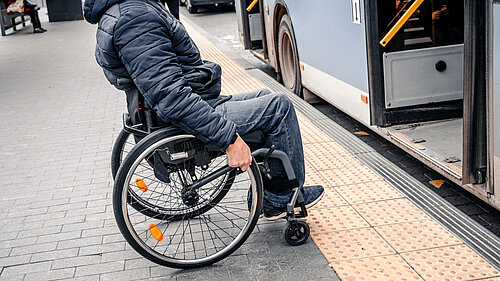Making Climate Change Action Inclusive

Climate change stands as one of the defining challenges of our era, demanding a united effort across all fronts, including individual action. Yet, in our pursuit of a sustainable future, we must ensure that no one is left behind.
While there have been many progressive steps in reducing climate change in recent years, efforts to consider the specific needs of disabled and older people have often been missed.
This inaccessibility not only hampers disabled individuals' ability to contribute to the fight against climate change, but also perpetuates their feelings of exclusion from society. Striving for equality and addressing the climate crisis are interwoven objectives that must be pursued hand in hand.
Single-use plastics used in Health and Social Care contexts create millions of tonnes of plastic waste a year, much of which will go to landfill or be incinerated.
While there are some alternatives to single-use plastics in equipment used for medical, social care and accessibility equipment, many are unavailable, unaffordable or impractical for some people.
Many older and disabled people have experienced difficulties with different climate change or pollution prevention strategies such as the banning of plastic straws, pedestrianisation, cycle lanes and Low Traffic Neighbourhoods, which often fail to take their needs into account.
Many transport alternatives to private cars remain inaccessible or unaffordable for disabled and older people, especially where they require adaptive or alternate provision.
Liberal Democrats have passed new policy today to make the fight against climate change accessible to all:
- Allocating 3% of government research and development funding on environmental and anti-climate change projects centred around bringing benefits and changes to the health and social care sectors.
- And a further 2% to projects that will support disabled people to live more environmentally friendly lives.
- Requirements on NHS trusts, care agencies, residential facilities and local authorities to develop strategies to reduce plastic use.
- Introducing schemes to support accessible environmentally friendly transport options such as tricycles or handcycles.
- Ensuring all public transport and infrastructure companies make their provision completely accessible by 2027.
- Requiring the government to work with disabled people to mitigate any negative impact on them from reducing emissions, improving public transport and improving public spaces.
The imperative for inclusive climate action arises from the disproportionate impact of climate change on disabled individuals. Regrettably, they are often excluded from discussions shaping our response to this crisis, leading to policies that inadvertently perpetuate inequalities. From urban planning that neglects disabled accessibility to the removal of parking spaces for cycle lanes, these oversights hinder their day-to-day lives.
This inequitable approach has ripple effects, hampering our quest for climate neutrality. With over 10 million disabled individuals in the UK, excluding them from active climate change engagement poses a significant obstacle to achieving our net-zero goals.
By championing inclusive climate change policies, we stand not only for a more equitable society but also for a sustainable future that embraces and uplifts every individual, leaving no one behind.